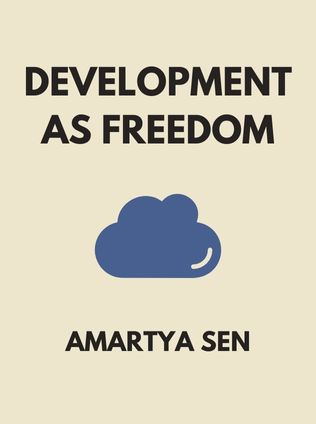
About the Author: Amartya Sen
Amartya Sen, a Nobel Prize-winning economist and philosopher, has profoundly impacted how the world views economic development and freedom. Born in 1933 in Santiniketan, India, Sen grew up in a society that deeply valued education and intellectual exploration. He pursued his academic studies at Presidency College in Kolkata and later at Trinity College, Cambridge. Throughout his career, Sen has held prestigious positions at universities such as Harvard, Oxford, and Cambridge, contributing extensively to the fields of welfare economics, social choice theory, and development economics.
Sen’s most celebrated work, Development as Freedom, was published in 1999 and has since been a seminal text in understanding the true meaning of economic development. Sen’s approach to development challenges the conventional wisdom that equates economic growth with development, arguing instead that true development must be measured by the expansion of freedoms and capabilities available to individuals.
The influence of Sen’s work extends beyond academia. His ideas have shaped global policy, particularly through his involvement in the creation of the United Nations’ Human Development Index (HDI), a more comprehensive measure of national progress than Gross Domestic Product (GDP). Sen’s work emphasizes that economic policies should focus not merely on wealth accumulation but on creating conditions that allow people to live lives they have reason to value.
Main Idea of Development as Freedom
The central thesis of Development as Freedom is that development should be understood as a process of expanding the real freedoms that individuals enjoy, rather than merely increasing income or economic output. Sen argues that freedom is both the primary end and the principal means of development. This dual role of freedom underscores its intrinsic and instrumental value—freedom is valuable in itself, and it is also essential for the achievement of other ends, including economic prosperity.
Sen’s argument is revolutionary in that it redefines poverty not just as a lack of income, but as a deprivation of basic capabilities—the substantive freedoms to choose a life one has reason to value. These capabilities include the ability to avoid starvation, to have access to education and healthcare, and to participate in political and social activities. By shifting the focus from economic growth to capability expansion, Sen broadens the scope of development to include social, political, and economic dimensions.
In making his case, Sen identifies five distinct types of freedoms that are essential to development: political freedoms, economic facilities, social opportunities, transparency guarantees, and protective security. These freedoms are interconnected and mutually reinforcing, creating a foundation for sustainable human development. Sen emphasizes that expanding these freedoms is not only the goal of development but also the most effective means of achieving other aspects of development, such as economic growth and social progress.
Table of Contents
- Freedom as the Primary End and Means of Development
- Redefining Poverty as Capability Deprivation
- The Five Types of Freedom
- Implications for Policy and Global Development
- Case Studies and Examples
- Conclusion: The Legacy of Amartya Sen
Freedom as the Primary End and Means of Development
Sen’s argument that freedom is both the primary end and the principal means of development is central to understanding his philosophy. He asserts that development cannot be solely measured by economic indicators such as GDP or income levels. Instead, it must be assessed by the extent to which people have the freedom to lead the lives they value. This concept is deeply rooted in the philosophical traditions of thinkers like John Stuart Mill, who emphasized the importance of liberty and individual autonomy.
Sen states, “
Development consists of the removal of various types of unfreedoms that leave people with little choice and little opportunity of exercising their reasoned agency.”This highlights that true development must eliminate constraints that limit people’s ability to pursue their goals, whether those constraints are economic, social, or political.
Sign up for FREE and get access to 1,400+ books summaries.
You May Also Like
The Subtle Art of Not Giving a F*ck
A Counterintuitive Approach to Living a Good Life
By Mark MansonRich Dad Poor Dad
What the Rich Teach Their Kids About Money - That the Poor and Middle Class Do Not!
By Robert T. KiyosakiHow To Win Friends and Influence People
The All-Time Classic Manual Of People Skills
By Dale CarnegieFreakonomics
A Rogue Economist Explores the Hidden Side of Everything
By Steven D. Levitt and Stephen J. DubnerI Am Malala
The Story of the Girl Who Stood Up for Education and Was Shot by the Taliban
By Malala Yousafzai



















